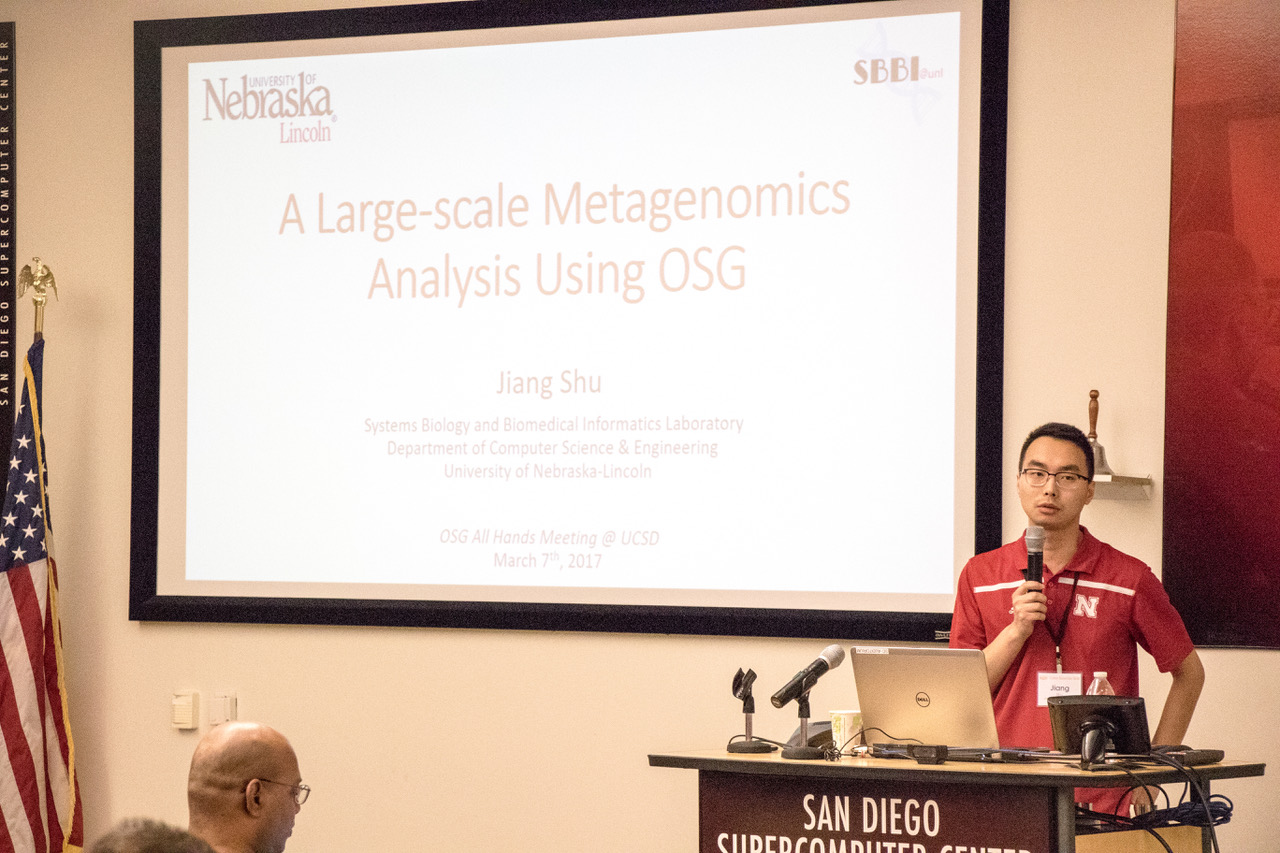May 04, 2017
By Victoria Grdina

Imagine being able to complete nine years of research in just a few weeks. The Open Science Grid has made it possible for students utilizing its resources at the University of Nebraska-Lincoln.
The Open Science Grid a global consortium of about 50 institutions and 130 sites that share resources internationally and collaborate on scientific projects. One of those institutions is the university’s Holland Computing Center, where Ph.D. student Jiang Shu was able to complete his research with assistant professor Juan Cui in the Systems Biology and Biomedical Informatics (SBBI) Lab.
Shu had utilized OSG resources for a number of projects in the past, and was selected to attend the OSG Users School in the summer of 2015. His latest project was so unique that he was invited to present it at OSG’s All Hands Meeting in California this year.
Stemming from the collaborative research between Dr. Cui and Dr. Janos Zempleni’s labs, Shu’s project examined cell to cell communication by assessing the microbial sequences in exosomes found in animal body fluid. To conduct his study, he needed to conduct a metagenomic analysis on six separate samples of exosomes against 4,742 different microbial genomes, creating 28,452 analysis jobs total. He estimated it would take 81,000 CPU hours — nine years on a standard desktop PC — to complete the analysis. By using OSG, Shu completed the project in 17 days.
Shu explained that in many life science studies, a wide range of data isn’t often examined because of such time constraints, potentially distorting discoveries. Utilizing OSG for future testing could revolutionize the way scientists study complex subjects like cancer.
“OSG provides a way for us to see the whole picture of how a cell evolves during a tumor progression…through mining the multi-level molecular data generated by the high throughput technology,” Shu said. “A small data set is maybe biased. When you observe those things, you want as big of a data set as you can have, but having a bigger data set means a longer computation.”
Not only does OSG accelerate the analysis process and save time, but it also eliminates unnecessary challenges for users with minimal programming knowledge.
“It’s actually very powerful for life science studies, because not many of those users are in computer science,” Shu said. “OSG doesn’t require extra efforts to optimize the code, so we can save a lot of time on the programming side and spend more time thinking about how to do the research.”
OSG’s shared resources have certainly benefitted users like Shu at Nebraska, but the university has also been able to offer other forms of support in return. In addition to the several HCC members who work on OSG projects, HCC Director David Swanson is currently the OSG Council Chair, and Nebraska research assistant professor of computer science and engineering Brian Bockelman heads a division of OSG responsible for software and technology. Bockelman said HCC’s ability to build and contribute to a community of sharing is a win-win for everyone.
“We’ve always had the feeling that if our computer sits idle for an hour, we’re not getting that hour back,” Bockelman said. “You don’t get to put it in the bank and get two hours later on, so we think that sharing is important to advance this larger field. OSG allows us to contribute our excess capacity to other scientific fields.”
In his role, Bockelman provides day to day management of OSG technology and works with other HCC members to continuously improve it. Bockelman said HCC is often one of the first sites to test new software and updates, working out bugs before they can cause issues on other sites.
“I think we’ve got a wonderful team that pushes for the software and pushes for the science,” Bockelman said. “I think OSG really benefits from how tightly integrated and how closely as a team HCC works.”
Shu agrees that the partnership has been highly beneficial for all involved. He hopes to see more researchers in other fields get involved with OSG and take advantage of the resources it offers to explore new areas of science in the future.
“If we utilize OSG, we can improve the life science and biology studies, and based on the feedback from us, we can help OSG make its system more efficient and more friendly,” Shu said. “And for me it’s gaining the knowledge and experience from both ends. I think it’s a very good situation for all parties.”